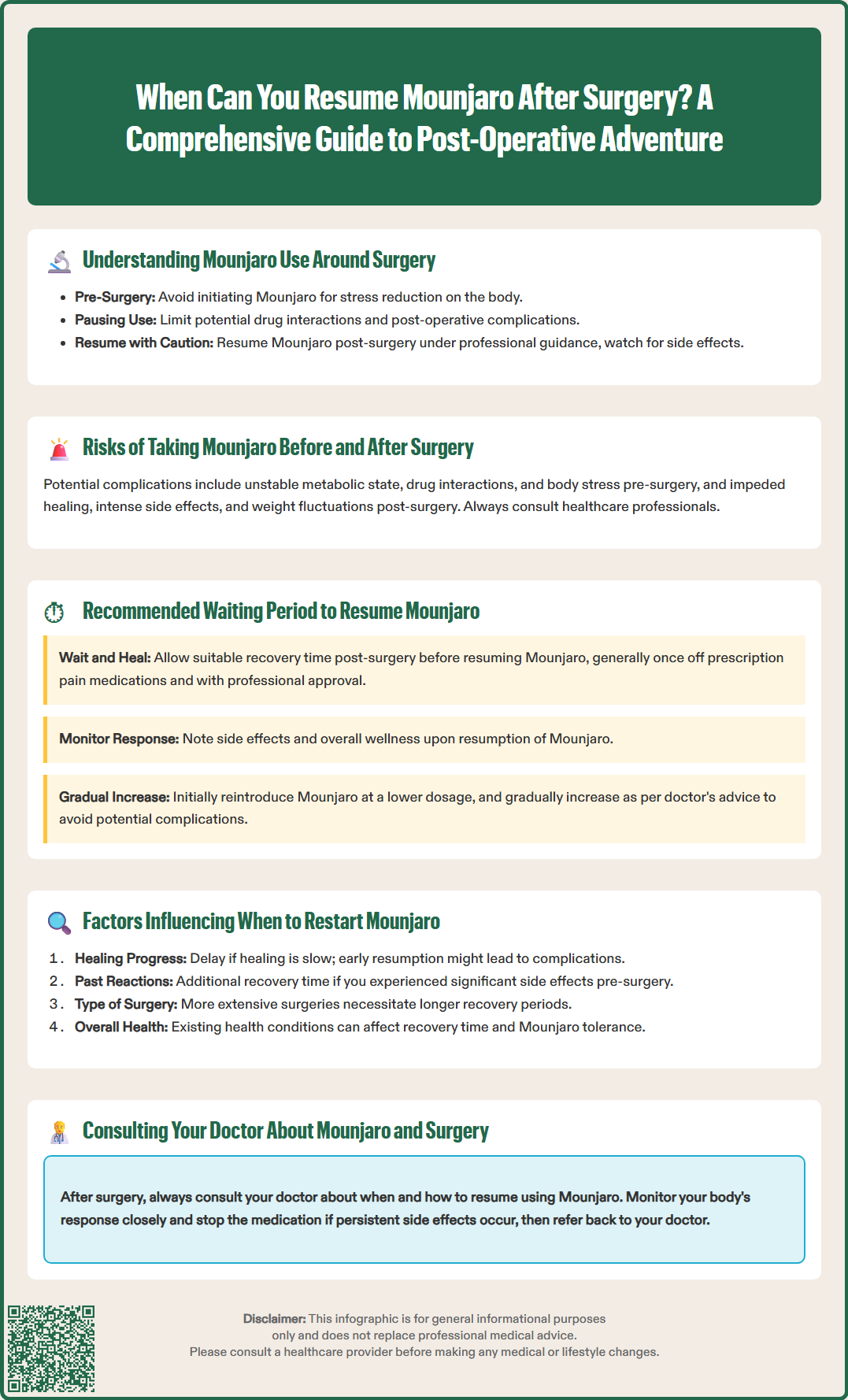LOSE WEIGHT WITH MEDICAL SUPPORT — BUILT FOR MEN
- Your personalised programme is built around medical care, not willpower.
- No generic diets. No guesswork.
- Just science-backed results and expert support.
Find out if you’re eligible

Mounjaro (tirzepatide) is a GLP-1 and GIP receptor agonist used in the UK for type 2 diabetes and weight management. When undergoing surgery, careful perioperative management is essential due to tirzepatide's effects on gastric emptying and potential aspiration risk during anaesthesia. Current UK guidance from the Clinical Pharmacy Association and Centre for Perioperative Care emphasises individualised risk assessment, with many patients able to continue treatment throughout the perioperative period. Understanding when and how to safely resume Mounjaro after surgery requires consideration of your procedure type, recovery progress, and clinical readiness rather than fixed timeframes.
Quick Answer: Mounjaro (tirzepatide) can be resumed after surgery once you are eating and drinking normally, bowel function has returned, post-operative nausea has resolved, and your surgical team or GP has given explicit approval.
Mounjaro (tirzepatide) is a glucagon-like peptide-1 (GLP-1) and glucose-dependent insulinotropic polypeptide (GIP) receptor agonist licensed in the UK for the treatment of type 2 diabetes mellitus. For weight management in adults with obesity or overweight with weight-related comorbidities, the same medication is licensed as Mounjaro (tirzepatide) in the UK following NICE guidance. While highly effective for glycaemic control and weight reduction, tirzepatide requires careful perioperative management.
The primary concern relates to delayed gastric emptying, a well-documented pharmacological effect of GLP-1 receptor agonists. Tirzepatide slows the rate at which food and liquids leave the stomach, which under normal circumstances contributes to satiety and improved glucose control. During anaesthesia, this delayed gastric emptying may increase the risk of pulmonary aspiration—a potentially serious complication where stomach contents enter the lungs. Even when patients have followed standard fasting instructions (typically 6 hours for solids and 2 hours for clear fluids before surgery, though local policies may vary), residual gastric contents may remain.
Additionally, tirzepatide can cause nausea and vomiting, which are particularly problematic in the perioperative period. These gastrointestinal effects may complicate post-operative recovery and interfere with the resumption of oral intake.
According to the UK Clinical Pharmacy Association (UKCPA) Perioperative Medicines Handbook and guidance from the Centre for Perioperative Care (CPOC) and Association of Anaesthetists, most patients can continue tirzepatide during the perioperative period with appropriate individual risk assessment. However, for patients experiencing significant gastrointestinal symptoms, those in early dose-escalation phases, or those with pre-existing gastroparesis, a more cautious approach may be warranted. Clear communication between patients, prescribers, and surgical teams is essential to ensure optimal perioperative safety.
The timing for restarting tirzepatide following surgery depends on several factors, with decisions made on an individual basis rather than fixed timelines. According to the UK Clinical Pharmacy Association (UKCPA) Perioperative Medicines Handbook, the key consideration is not a specific timeframe but rather the patient's clinical condition.
For patients who have continued tirzepatide throughout the perioperative period (as is now common practice in the UK with appropriate risk assessment), no restart is necessary. However, if tirzepatide has been temporarily withheld, resumption should be based on clinical readiness rather than arbitrary timeframes.
Following surgery, the decision to resume tirzepatide should be individualised based on the type and extent of the surgical procedure, the patient's recovery progress, and their ability to tolerate oral intake. For minor procedures performed under local anaesthesia or brief sedation (such as dental work, endoscopy, or minor dermatological surgery), patients may restart tirzepatide once they are eating and drinking normally without nausea or vomiting.
For major surgical procedures—particularly those involving the gastrointestinal tract, such as bariatric surgery, bowel resection, or abdominal operations—a more cautious approach is warranted. In these cases, tirzepatide should generally be withheld until the patient has fully resumed normal oral intake, bowel function has returned, and any post-operative nausea has resolved.
If you take tirzepatide for type 2 diabetes, the Joint British Diabetes Societies (JBDS) guidelines recommend perioperative blood glucose monitoring and may suggest alternative diabetes management strategies during any period when tirzepatide is withheld.
Patients should never restart tirzepatide without explicit approval from their surgical team, diabetes specialist or GP. If a dose is missed, follow the instructions in the medication's Summary of Product Characteristics (SmPC): if the next scheduled dose is within 4 days, administer the missed dose as soon as possible; otherwise, skip it and continue with the regular schedule.

Multiple clinical factors influence the appropriate timing for resuming tirzepatide after surgery, and these must be carefully considered on an individual basis.
Type of surgical procedure: The nature and invasiveness of surgery play a crucial role. Minor outpatient procedures with minimal tissue trauma typically allow earlier resumption compared to major inpatient operations. Gastrointestinal surgery, in particular, requires extended caution due to altered anatomy, healing anastomoses (surgical connections between organs), and the need to establish normal gut function before reintroducing medications that affect gastric motility.
Post-operative complications: Any surgical complications—such as infection, delayed wound healing, anastomotic leak, ileus (temporary paralysis of the bowel), or persistent nausea and vomiting—necessitate postponing tirzepatide resumption. The medication should only be restarted once complications have resolved and the patient is clinically stable.
Nutritional status and oral intake: Tirzepatide can only be safely resumed when the patient is tolerating adequate oral nutrition and hydration. Following major surgery, particularly gastrointestinal procedures, there is often a graduated return to normal eating, progressing from clear fluids to soft foods and eventually a regular diet. Tirzepatide should not be restarted until this progression is well established, as its appetite-suppressing effects could compromise nutritional recovery.
Glycaemic control requirements: For patients with type 2 diabetes, the urgency of resuming tirzepatide depends on alternative glucose management strategies in place. If blood glucose levels are well controlled with other medications or insulin during the perioperative period, there may be less urgency to restart immediately. Conversely, if glycaemic control is deteriorating, earlier resumption (when clinically appropriate) may be beneficial, in line with NICE guideline NG28 for type 2 diabetes management.
Individual tolerance and previous side effects: Patients who experienced significant gastrointestinal side effects when initially starting tirzepatide may require a more gradual reintroduction. According to the SmPC for Mounjaro, after a prolonged interruption or significant prior GI adverse effects, re-titration from a lower dose may be considered under prescriber guidance to minimise post-operative nausea and ensure adequate nutritional intake during recovery.
Recognising when it is safe to restart tirzepatide requires attention to several clinical indicators that suggest adequate surgical recovery and readiness to tolerate the medication's effects. The UKCPA Perioperative Medicines Handbook emphasises clinical readiness rather than fixed timeframes.
Key signs of readiness include:
Normal oral intake established: You should be eating and drinking regularly without difficulty, nausea, or vomiting. Your diet should have progressed beyond clear fluids to include solid foods appropriate to your surgical recovery stage.
Bowel function restored: For abdominal or gastrointestinal surgery, return of normal bowel movements (passing flatus and stool) indicates that gut motility has recovered. This is essential before reintroducing a medication that slows gastric emptying.
Absence of nausea and vomiting: Post-operative nausea should have completely resolved. Introducing tirzepatide whilst still experiencing nausea could exacerbate symptoms and compromise nutritional recovery.
Adequate pain control: Pain should be well managed with oral medications. Severe pain requiring strong opioid analgesics (which themselves slow gut motility) may indicate it is too early to restart tirzepatide.
Wound healing progressing normally: Surgical incisions should be healing appropriately without signs of infection, dehiscence (wound separation), or other complications. Adequate nutrition is essential for wound healing, and tirzepatide's appetite-suppressing effects should not compromise this.
Medical clearance obtained: Most importantly, you should have explicit approval from your surgical team, diabetes specialist or GP before restarting. This may occur at a scheduled post-operative review appointment or via telephone consultation.
If you experience persistent nausea, vomiting, inability to eat or drink, severe abdominal pain, or signs of surgical complications (fever, wound discharge, increasing pain), do not restart tirzepatide and contact your surgical team or GP urgently. For severe symptoms, contact NHS 111 or attend A&E as appropriate. These symptoms may indicate complications requiring medical assessment rather than medication resumption.
Effective communication between patients taking tirzepatide and their surgical team is essential for safe perioperative management. Several important topics should be addressed well in advance of any planned procedure.
Pre-operative discussions should include:
Medication disclosure: Inform your surgical team that you are taking tirzepatide (Mounjaro for type 2 diabetes or for weight management) at your earliest appointment, ideally during the initial surgical consultation. Provide details of your dose, frequency, and how long you have been taking it. Do not assume this information has been communicated between different healthcare providers.
Risk assessment approach: According to guidance from the Centre for Perioperative Care (CPOC) and Association of Anaesthetists, most patients can continue tirzepatide during the perioperative period with appropriate risk assessment. Discuss your individual risk factors, particularly if you're experiencing significant gastrointestinal symptoms, are in an early dose-escalation phase, or have pre-existing gastroparesis.
Alternative diabetes management: If you take tirzepatide for type 2 diabetes, discuss how your blood glucose will be managed perioperatively. This may involve temporary adjustments to other diabetes medications, blood glucose monitoring protocols, or short-term insulin therapy, in line with Joint British Diabetes Societies (JBDS) guidelines. Consider involving your diabetes specialist team or diabetes specialist nurse (DSN) in this planning.
Resumption plan: Ask specifically when you can safely restart tirzepatide after surgery if it has been withheld. Request clear criteria (such as tolerating normal diet, bowel function restored) and clarify who will authorise resumption—the surgical team, your diabetes specialist, or your GP.
Post-operative follow-up: Establish how and when you will receive clearance to restart. Will this be at a scheduled post-operative appointment, or should you contact your GP? Ensure you have appropriate contact details if questions arise.
Weight management implications: If taking tirzepatide primarily for weight management, discuss how the temporary interruption may affect your progress and whether any additional support or dietary guidance is needed during the perioperative period.
Patients should also inform their anaesthetist about tirzepatide use during pre-operative assessment, as this directly affects anaesthetic planning and aspiration risk management. Maintaining open dialogue with all members of your healthcare team ensures coordinated, safe care throughout your surgical journey.
According to UK guidance from the Clinical Pharmacy Association and Centre for Perioperative Care, most patients can continue Mounjaro (tirzepatide) during the perioperative period with appropriate individual risk assessment. Your surgical team will evaluate factors such as procedure type, gastrointestinal symptoms, and aspiration risk to determine the safest approach for your specific situation.
There is no fixed timeframe for restarting Mounjaro after surgery. Resumption depends on clinical readiness including tolerating normal oral intake, return of bowel function, resolution of post-operative nausea, and explicit approval from your surgical team or GP rather than a specific number of days.
Inform your surgical team at your earliest appointment that you take Mounjaro (tirzepatide), including your dose, frequency, and duration of treatment. Discuss your individual risk factors, alternative diabetes management if applicable, and establish a clear plan for perioperative management and post-operative resumption with appropriate follow-up arrangements.
All medical content on this blog is created based on reputable, evidence-based sources and reviewed regularly for accuracy and relevance. While we strive to keep content up to date with the latest research and clinical guidelines, it is intended for general informational purposes only.
DisclaimerThis content is not a substitute for professional medical advice, diagnosis, or treatment. Always consult a qualified healthcare professional with any medical questions or concerns. Use of the information is at your own risk, and we are not responsible for any consequences resulting from its use.